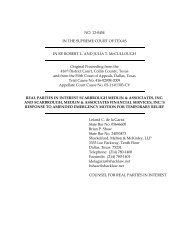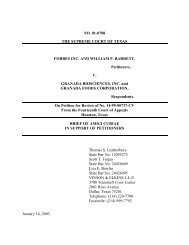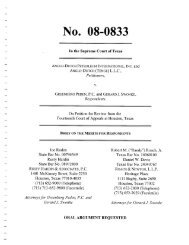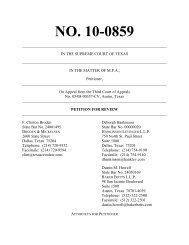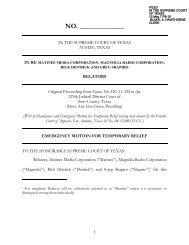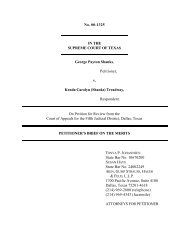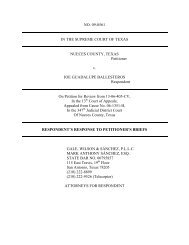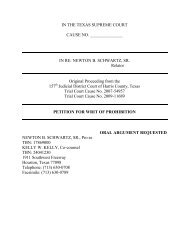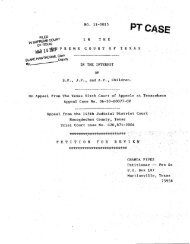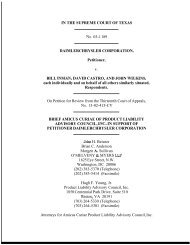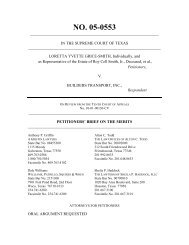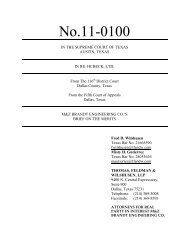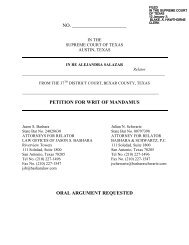Petition for Writ of Mandamus - Filed - Supreme Court of Texas
Petition for Writ of Mandamus - Filed - Supreme Court of Texas
Petition for Writ of Mandamus - Filed - Supreme Court of Texas
You also want an ePaper? Increase the reach of your titles
YUMPU automatically turns print PDFs into web optimized ePapers that Google loves.
To compute Net Distributive Income from an S corporation:<br />
From IRS Form 1120S K-1, add boxes 1, 2, 3, 4, 5a, 6, 7,<br />
8a, 9 and 10. Subtract from that result the sum <strong>of</strong> boxes<br />
11, 12 and 14, Code L (Foreign taxes).<br />
Note: A single member LLC treated as a sole proprietorship <strong>for</strong> federal<br />
tax purposes may include in compensation the net distributive<br />
income to the single member that is a natural person.<br />
Wages and cash compensation DOES NOT include:<br />
• payments on IRS Forms 1099;<br />
• amounts excluded from gross revenue;<br />
• an employer's share <strong>of</strong> employment taxes;<br />
• amounts paid to an employee whose primary employment<br />
is directly associated with the operation <strong>of</strong> a facility that<br />
is located on property owned or leased by the federal<br />
government and managed or operated primarily to house<br />
members <strong>of</strong> the armed <strong>for</strong>ces <strong>of</strong> the United States.<br />
Note: A staff leasing services company may only include wages<br />
and cash compensation paid to the entity's own employees,<br />
and may not include wages, benefits, workers' compensation<br />
benefits or payroll taxes <strong>of</strong> assigned employees. A taxable<br />
entity that is a client company that contracts with a staff<br />
leasing services company may include amounts paid to the<br />
staff leasing services company relating to the assigned<br />
employees <strong>for</strong> wages as defined by Item 15 (Wages & Cash<br />
Compensation) and Item 17 (Other — Compensation <strong>of</strong><br />
Active Duty Personnel), and may include amounts paid <strong>for</strong><br />
employee benefits including workers' compensation<br />
benefits, as defined by Item 16 (Employee Benefits). The<br />
client company may not include any administrative fee,<br />
payroll taxes or other amounts related to the assigned<br />
employees. In addition, the client company may not include<br />
as compensation any amounts reported on IRS Forms 1099.<br />
Note: A management company may not include as wages or cash<br />
compensation any amounts reimbursed by a managed<br />
entity. A managed entity includes as compensation<br />
reimbursements made to the management company <strong>for</strong><br />
wages and compensation as if the reimbursed amounts had<br />
been paid to employees <strong>of</strong> the managed entity.<br />
Item 16. Employee benefits<br />
Enter the cost <strong>of</strong> benefits provided to <strong>of</strong>ficers, directors,<br />
owners, partners and employees, including workers'<br />
compensation, health care and retirement benefits. The<br />
deduction <strong>for</strong> employee benefits is not limited to $330,000<br />
per person but is only deductible to the extent deductible<br />
<strong>for</strong> federal income tax purposes.<br />
Item 17. Other<br />
The only allowable amounts to be entered on this line are<br />
related to undocumented worker compensation and<br />
compensation <strong>of</strong> active duty personnel. These amounts will<br />
<strong>of</strong>fset one another. The result can be either a negative<br />
(undocumented worker compensation) or a positive number<br />
(active duty personnel compensation).<br />
Undocumented Worker Compensation<br />
A taxable entity must exclude from compensation any wages<br />
and cash compensation paid to undocumented workers <strong>for</strong><br />
the period upon which the tax is based. "Undocumented<br />
worker" means a person who is not lawfully entitled to be<br />
present and employed in the United States.<br />
Compensation <strong>of</strong> Active Duty Personnel<br />
A taxable entity may include, as an additional cost, the<br />
wages and cash compensation paid during the period upon<br />
which the report is based to an individual <strong>for</strong> the period the<br />
individual is serving on active duty as a member <strong>of</strong> the armed<br />
<strong>for</strong>ces <strong>of</strong> the United States if the individual is a resident <strong>of</strong><br />
this state at the time the individual is ordered to active duty,<br />
plus the cost <strong>of</strong> training a replacement <strong>for</strong> the individual.<br />
Form 05-158-B<br />
<strong>Texas</strong> Franchise Tax Report — Page 2<br />
Item 19. Revenue<br />
Multiply Item 10 times 70%. If less than zero, enter zero.<br />
Item 20. Revenue<br />
Item 10 minus Item 14 — COGS. If less than zero, enter zero,<br />
Note: A taxable entity may elect to use COGS to compute margin<br />
only if the taxable entity sells real or tangible personal<br />
property in the ordinary course <strong>of</strong> business or if the taxable<br />
entity qualifies to compute COGS under any one <strong>of</strong> the<br />
exceptions noted in <strong>Texas</strong> Tax Code Sec. 171.1012 or Rule<br />
3.588. Enter an amount only if the entity qualifies to use<br />
COGS to compute margin.<br />
Item 21. Revenue<br />
Item 10 minus Item 18 — Compensation. If less than zero,<br />
enter zero.<br />
Item 22. Margin<br />
Enter the lowest amount from Items 19, 20 or 21.<br />
Item 23. Gross receipts in <strong>Texas</strong><br />
<strong>Texas</strong> gross receipts and gross receipts everywhere should<br />
be reported <strong>for</strong> the same accounting period used in the<br />
calculation <strong>of</strong> total revenue. Gross receipts means all<br />
revenues reportable by a taxable entity on its federal tax<br />
return, without deduction <strong>for</strong> the COGS or other costs<br />
incurred unless otherwise provided <strong>for</strong> by law.<br />
"Gross receipts in <strong>Texas</strong>" means:<br />
• sales <strong>of</strong> tangible personal property when the property is<br />
delivered or shipped to a purchaser within <strong>Texas</strong>;<br />
• sales <strong>of</strong> real property located in <strong>Texas</strong>, including royalties<br />
from oil, gas or other mineral interests;<br />
• services per<strong>for</strong>med within <strong>Texas</strong>;<br />
• rentals <strong>of</strong> property situated in <strong>Texas</strong>;<br />
• royalties from use <strong>of</strong> patents or copyrights within <strong>Texas</strong>;<br />
• revenues from the use <strong>of</strong> trademarks, franchises or<br />
licenses within <strong>Texas</strong>. These revenues include receipts<br />
from the sale or license <strong>of</strong> computer s<strong>of</strong>tware or programs<br />
if the legal domicile <strong>of</strong> the payor is <strong>Texas</strong>;<br />
• the net gain/loss from the sales <strong>of</strong> investments or capital<br />
assets. If both <strong>Texas</strong> and out-<strong>of</strong>-state sales have occurred,<br />
then a separate calculation <strong>of</strong> net gains and losses on <strong>Texas</strong><br />
sales must be made. If the combination <strong>of</strong> net gains and<br />
losses results in a net loss, the taxable entity should net the<br />
loss against other receipts, but not below zero. In no instance<br />
shall the apportionment factor be greater than 1. Net gain/<br />
loss on sales <strong>of</strong> intangibles held as capital assets or<br />
investments is apportioned to the location <strong>of</strong> the payor.<br />
Examples <strong>of</strong> intangibles include, but are not limited to,<br />
17



